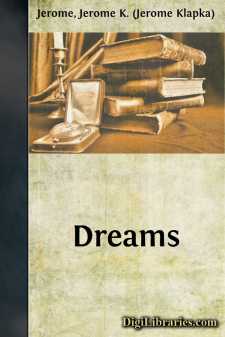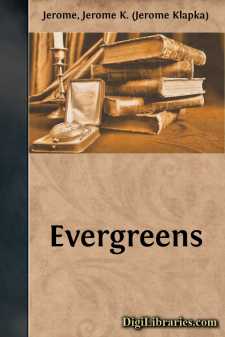Categories
- Antiques & Collectibles 13
- Architecture 36
- Art 48
- Bibles 22
- Biography & Autobiography 813
- Body, Mind & Spirit 142
- Business & Economics 28
- Children's Books 17
- Children's Fiction 14
- Computers 4
- Cooking 94
- Crafts & Hobbies 4
- Drama 346
- Education 46
- Family & Relationships 57
- Fiction 11829
- Games 19
- Gardening 17
- Health & Fitness 34
- History 1377
- House & Home 1
- Humor 147
- Juvenile Fiction 1873
- Juvenile Nonfiction 202
- Language Arts & Disciplines 88
- Law 16
- Literary Collections 686
- Literary Criticism 179
- Mathematics 13
- Medical 41
- Music 40
- Nature 179
- Non-Classifiable 1768
- Performing Arts 7
- Periodicals 1453
- Philosophy 64
- Photography 2
- Poetry 896
- Political Science 203
- Psychology 42
- Reference 154
- Religion 513
- Science 126
- Self-Help 84
- Social Science 81
- Sports & Recreation 34
- Study Aids 3
- Technology & Engineering 59
- Transportation 23
- Travel 463
- True Crime 29
Jerome K. (Jerome Klapka) Jerome
Jerome Klapka Jerome was an English writer and humorist best known for his comic travelogue "Three Men in a Boat," published in 1889. His works often feature light-hearted and witty observations on everyday life and human nature, which made him popular during the late Victorian and Edwardian eras. Jerome also wrote plays, essays, and other novels, contributing significantly to English humor literature.
Author's Books:
Sort by:
This is the story, among others, of Henry the waiter—or, as he now prefers to call himself, Henri—told to me in the long dining-room of the Riffel Alp Hotel, where I once stayed for a melancholy week “between seasons,” sharing the echoing emptiness of the place with two maiden ladies, who talked all day to one another in frightened whispers. Henry’s construction I have discarded for its...
more...
CHAPTER I I had a vexing dream one night, not long ago: it was about a fortnight after Christmas. I dreamt I flew out of the window in my nightshirt. I went up and up. I was glad that I was going up. “They have been noticing me,” I thought to myself. “If anything, I have been a bit too good. A little less virtue and I might have lived longer. But one cannot have everything.” The...
more...
CLOCKS. There are two kinds of clocks. There is the clock that is always wrong, and that knows it is wrong, and glories in it; and there is the clock that is always right—except when you rely upon it, and then it is more wrong than you would think a clock could be in a civilized country. I remember a clock of this latter type, that we had in the house when I was a boy, routing us all up at three...
more...
The most extraordinary dream I ever had was one in which I fancied that, as I was going into a theater, the cloak-room attendant stopped me in the lobby and insisted on my leaving my legs behind me. I was not surprised; indeed, my acquaintanceship with theater harpies would prevent my feeling any surprise at such a demand, even in my waking moments; but I was, I must honestly confess, considerably...
more...
They look so dull and dowdy in the spring weather, when the snow drops and the crocuses are putting on their dainty frocks of white and mauve and yellow, and the baby-buds from every branch are peeping with bright eyes out on the world, and stretching forth soft little leaves toward the coming gladness of their lives. They stand apart, so cold and hard amid the stirring hope and joy that are throbbing...
more...
ON THE ART OF MAKING UP ONE'S MIND "Now, which would you advise, dear? You see, with the red I shan't be able to wear my magenta hat." "Well then, why not have the grey?" "Yes—yes, I think the grey will be MORE useful." "It's a good material." "Yes, and it's a PRETTY grey. You know what I mean, dear; not a COMMON grey. Of course grey is always...
more...
ON BEING IDLE. Now, this is a subject on which I flatter myself I really am au fait. The gentleman who, when I was young, bathed me at wisdom's font for nine guineas a term—no extras—used to say he never knew a boy who could do less work in more time; and I remember my poor grandmother once incidentally observing, in the course of an instruction upon the use of the Prayer-book, that it was...
more...
THE HERO. His name is George, generally speaking. "Call me George!" he says to the heroine. She calls him George (in a very low voice, because she is so young and timid). Then he is happy. The stage hero never has any work to do. He is always hanging about and getting into trouble. His chief aim in life is to be accused of crimes he has never committed, and if he can muddle things up with a...
more...
"Kindness," argued little Mrs. Pennycoop, "costs nothing." "And, speaking generally, my dear, is valued precisely at cost price," retorted Mr. Pennycoop, who, as an auctioneer of twenty years' experience, had enjoyed much opportunity of testing the attitude of the public towards sentiment. "I don't care what you say, George," persisted his wife; "he may be...
more...
THE SOUL OF NICHOLAS SNYDERS,OR THE MISER OF ZANDAM Once upon a time in Zandam, which is by the Zuider Zee, there lived a wicked man named Nicholas Snyders. He was mean and hard and cruel, and loved but one thing in the world, and that was gold. And even that not for its own sake. He loved the power gold gave him—the power to tyrannize and to oppress, the power to cause suffering at his will. They...
more...











